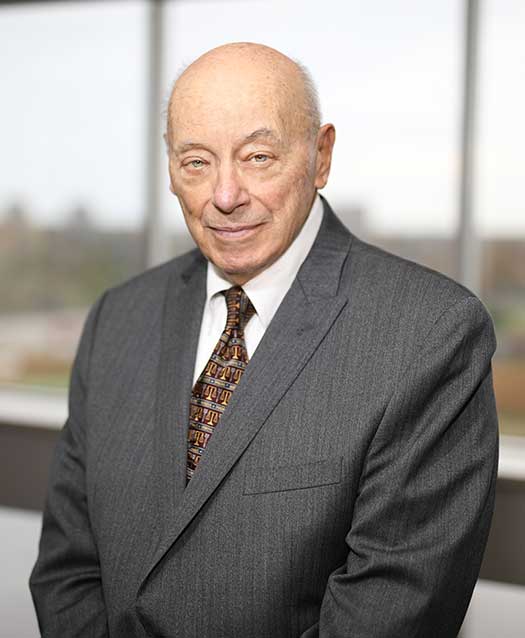
Bachelor of Arts from Fordham University
New York Law School
New York State Bar (1958)
New York State Courts
Federal Circuit Court of Appeals
United States Supreme Court
Member of the Knights of Columbus, Council No. 2852
Member of the B.P.O.E. Lodge No. 2107
A.O.H. Division 6
Nassau County Bar Association
Holy Name Society
Lakeville Estates Civic Association
Member of the Unified Court System’s Alternative Dispute Resolution Advisory Committee on Torts and Education for Judges and Lawyers
Referee and a Receiver in matters in the Supreme Court
The Honorable Edward G. McCabe, former Justice of the New York State Supreme Court, Administrative Judge of Nassau County and presiding Justice to the Appellate Term, is Special Counsel to the firm. He represents and counsels clients in a wide range of matters, such as zoning and land use planning and litigation and appeals. Justice McCabe also serves as an arbitrator and mediator.
Justice McCabe is a member of the Knights of Columbus, Council No. 2852; B.P.O.E. Lodge No. 2107; A.O.H. Division 6, the Nassau County Bar Association; the Holy Name Society and the Lakeville Estates Civic Association. Justice McCabe was honored as Man of the Year by the Long Beach Lawyers' Association, the Court Officer’s Benevolent Association, and the Fraternal Order of Court Officers. He has been honored by the Education and Assistance Corporation, the Legal Aid Society, the Irish Americans in Government, The Catholic Lawyers’ Guild and The Irish Feis Committee.
Justice McCabe was the Director of the Paralegal Studies Certificate Program at Hofstra University.
Justice McCabe’s career in public service spans over three decades, and is one of the most distinguished in the history of Nassau County.
Justice McCabe was first elected as a Supreme Court Justice in November 1985, and was reelected in November 1999. Justice McCabe has presided over all types of civil litigation, including cases involving commercial contracts, real estate, tax certiorari, condemnation, medical malpractice, personal injury and matrimonial cases.
During his tenure on the Supreme Court, Justice McCabe also served, for six years, as Chief Administrative Judge of the Nassau County court system. In this capacity, Justice McCabe was responsible for the administration of the Courts, including all judges and personnel. This service occurred during times of great change and challenges, including the security challenges of the post-9/11 environment, severe budgetary restraints and the introduction of computers to the court system.
After serving as Administrative Judge, Justice McCabe was appointed Presiding Justice of the Appellate Term of the New York State Supreme Court for the Second Judicial Department, Ninth and Tenth Judicial Districts.
Prior to his election to the Supreme Court, Justice McCabe served as County Attorney for Nassau County and as Town Attorney for the Town of North Hempstead. As the County Attorney, Justice McCabe served as Counsel to the County Executive and to the Commissioners and Department Heads throughout the County and managed the office that was responsible for all the County’s contracts, litigation, real estate, worker’s compensation matters and general municipal matters. While County Attorney, Justice McCabe also served on the Traffic Safety Board and the Youth Board.
From 1971 to 1978, Justice McCabe served first as Executive Assistant to the Supervisor of the Town of North Hempstead, and thereafter as Town Attorney for the Town of North Hempstead.
In 1970, Justice McCabe was appointed Law Secretary to the late Nassau County Supreme Court Justice, the Honorable Bernard Thompson. From 1967 through 1970, Justice McCabe served as an Assistant District Attorney for the County of Nassau. Prior to that time, Justice McCabe was in private legal practice.
While serving as the Administrative Judge, Justice McCabe instituted many programs and initiatives to benefit the public, the judiciary and members of the Bar. He consulted with the District Attorney to bring a Community Court to Nassau County. In addition, he instituted new programs in the Courts including Alternative Dispute Resolution, Differentiated Case Management, Early Neutral Evaluation (for matrimonial actions) and established a Commercial Division in Supreme Court, Nassau County.
Justice McCabe was also a member of the Unified Court System’s Alternative Dispute Resolution Advisory Committee on Torts and Education for Judges and Lawyers. Justice McCabe provided interaction with the public and the Courts through the Committee to Promote Public Trust and Confidence in the Court System where he served as Chair, as Administrative Judge, and the Nassau County Judicial Committee on Women in the Courts, where he served as Ex Officio Member.
Justice McCabe also instituted numerous programs in the Courts in conjunction with the Association for the Help of Retarded Children’s Next Step Program, including a Court floral beautification program and a Law Library project. In addition, Justice McCabe instituted a mammography screening program for prospective jurors with the help of 1 in 9, the Long Island Breast Cancer Coalition and the Nassau County Department of Health, a prostate screening program, and a Juror Blood Donation Program. Jurors summoned to jury duty in Nassau County participated in these programs while serving in the courthouse. The response by the jurors to these programs was overwhelming.
Since his retirement from the Courts, Justice McCabe was retained as the Director of the Paralegal Program and the Continuing Legal Education Program at Hofstra University. He has also served as a Mediator and an Arbitrator in matters including the Village of Freeport and the City of Long Beach. He has also been appointed as a Referee and a Receiver in matters in the Supreme Court.